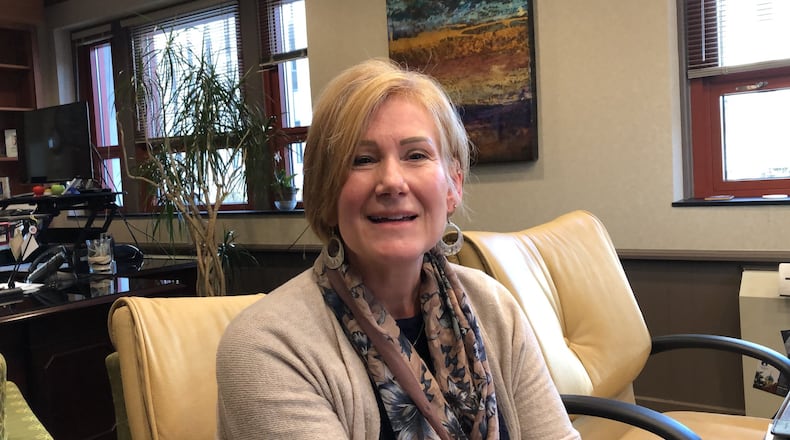“I would say it was incredibly uncommon. Because if you think about the amount of procurement activity we have, I could name on five fingers how many times different commissioners — so it wasn’t just Joey — would come inquiring about why a certain company was not selected,” Dickstein said in an interview last week.
Even so, she said she never would have imagined that Williams — a respected local banker, longtime city commissioner and former school board member — had agreed to accept a bribe in return for helping the demolition company.
In September Williams pleaded guilty in U.S. District Court to one count of corruptly soliciting a bribe after he admitted that he accepted renovation work on his home at a substantially reduced price in exchange for helping the contractor get city business. In January he was sentenced to a year in prison and is to surrender by mid-March.
His attorney declined to comment.
Williams and former city employee RoShawn Winburn, 46, were among seven people indicted in a federal investigation of public corruption revealed last year.
Winburn, who was fired as the city’s business and technical assistance administrator, pleaded guilty in February to one count of corruptly soliciting a bribe. Winburn admitted he accepted more than $6,500 from an unnamed local business owner seeking city contracts and provided that person with confidential city information about an upcoming contract.
RELATED: Ex-city of Dayton employee pleads guilty to soliciting a bribe
Authorities and Winburn’s attorney will not say if United Demolition Excavation and Site Management was that company, but he was assigned to help it overcome problems after Williams’ query prompted city officials to give the company another look.
Months after Williams intervention, and despite major problems reported by other cities that had used the company, Dayton awarded two contracts to United Demolition in 2015 and 2016, only to have them do the work so poorly that the city refused to pay a portion of the $371,268 in contracts.
Mike Marshall, co-owner of the company, denied that he was the confidential informant who renovated Williams’ home in exchange for help getting city projects. He declined further comment.
After the indictments were announced last April, the city began two processes, both now nearing completion, to prevent more corruption in the contracting process.
One, a still unreleased internal investigation by the law firm Green and Green, looked at procurement that came out of the Human Relations Council where Winburn worked with small and disadvantaged businesses, City Law Director Barbara Doseck said. The goal was to make sure no other criminal activity was occurring beyond what the FBI had uncovered.
“There was no evidence of criminal or fraudulent behavior,” said Doseck, who is reviewing the report and preparing recommendations to take to Dickstein.
Doseck does not believe the city has a “culture of corruption,” the term used by FBI Special Agent Joseph M. Deters when the indictments were announced.
“I think that we can strengthen our processes, I think we can create more oversight. I think that we can create more structure,” Doseck said. “But at the end of the day I think there are a majority of us who work very hard to serve this community and do so without any criminal behavior.”
RELATED: Informants, secret recordings reveal ex-city commissioner bribery scheme
A separate procurement task force report is nearly done, Dickstein said. It found no areas of high risk, but the city will make reforms in procurement practices that she plans to brief city commissioners on this week. That includes standardizing and formalizing the system for dealing with complaints about who received a contract.
An oversight committee that always includes the same staff members, likely including Dickstein or Doseck, also will be formed to handle all of those issues and to form what Dickstein referred to as a “firewall” against improper influence.
“We’ll have the same expert eyeballs sitting around evaluating lowest, best and responsiveness to be the final, official voice in the procurement process that will make the final determination and recommendation,” Dickstein said.
“Commission can always choose to not award a contract. They ultimately have final authority. What we wanted to do is keep the due diligence, the vetting of the (issue) in a more structured, formalized or standardized form,” Dickstein said. “So that this commission could be assured that procurement policies and processes and procedures were followed, in every case.”
RELATED: Indictments prompt city of Dayton to strengthen anti-fraud efforts
Wittenberg University Political Science Professor Robert Baker said it is normal for elected officials to do constituent services, such as looking into complaints from companies that lose out on bids. But it’s crucial that they avoid even the appearance of a conflict of interest or favoritism, he said.
Obviously taking bribes is bad, Baker said, but elected officials also should recuse themselves from decisions involving those with whom they have a close relationship.
“Normally, the mechanics and oversight of the bid process should be left to unelected officials,” such as department heads or public works engineers, rather than elected officials to avoid real or perceived conflicts of interest, he said.
Dickstein and Doseck both said it is not uncommon for local governments to help small businesses overcome problems so they can join the pool of potential public contractors.
“There’s opportunities for businesses to cure deficiencies and try to win contracts,” Dickstein said. “It’s not a one and done. You’re not forever out if you lack experiences or references.”
But in the case of United Demolition, Dickstein said that company will never get another city contract.
“It’s pretty clear there were signficant issues,” Dickstein said. “Let’s just leave it at that.”
See this related story: Confidential informants, secret recordings reveal ex-city commissioner bribery scheme
Officials push to reverse declines at Dayton International Airport
Dayton superintendent: it’s time to consider school bus seat belts
Cause undetermined in Pennsylvania bus crash that killed Dayton girl
Indictment: Businessman used money from insurance at casino for phone bill
About the Author




